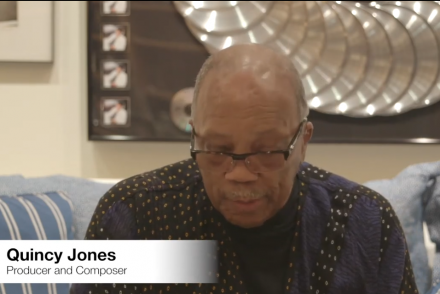Overview
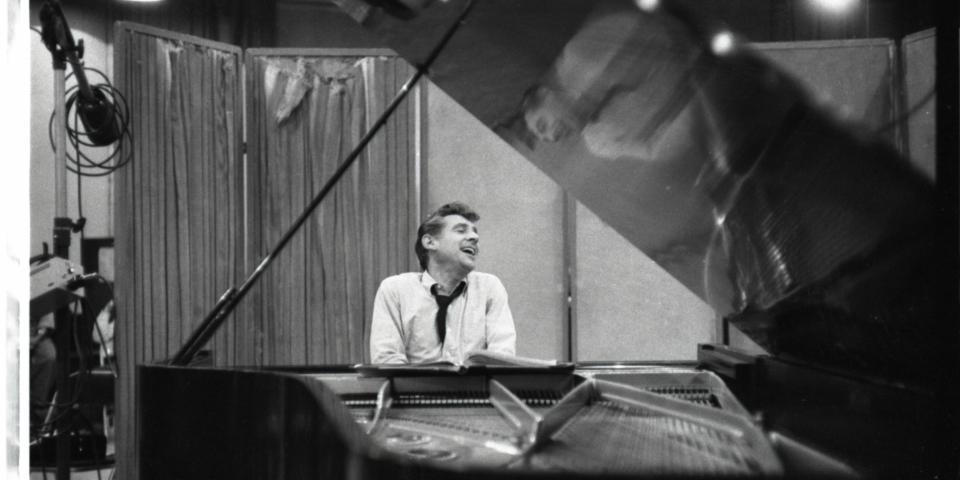 Photo by Don Hunstein, 1958; Courtesy of Sony Classical
Photo by Don Hunstein, 1958; Courtesy of Sony Classical
About Leonard Bernstein
Composer, conductor, educator, and humanitarian, LEONARD BERNSTEIN (August 25, 1918- October 14, 1990) forged his many talents with an irresistible personality to transform the way people everywhere hear and appreciate music. He broke rules, shattered precedents, and opened doors, insisting that music could, and should, play a vital role in the lives of all people.
Bernstein's successes as a composer ranged from the Broadway stage (most notably, West Side Story) to concert halls all over the world, where his orchestral and choral works continue to thrive. As a conductor of a vast repertoire, he was a dynamic presence on the podiums of the world's great orchestras for half a century, leaving a legacy that endures through an uncommonly rich and diverse catalogue of over 500 recordings and filmed performances. He was the first American-born and -trained conductor to be appointed music director of a major American orchestra, and the first to conduct the Berlin Philharmonic, the London Symphony Orchestra, the Royal Concertgebouw, among others.
From his earliest days, Bernstein was a true believer in the music of his time. The lasting popularity of the music of Mahler, Shostakovich, and many other 20th-century masters owes much to his inspired advocacy. Around the world he championed American composers such as Aaron Copland, William Schuman, Samuel Barber, Roy Harris, and Lukas Foss. The breadth of Bernstein's repertoire, the depth of his convictions, and the charismatic energy with which he articulated them, made him a superstar in the classical world and a beloved public figure.
Leonard Bernstein’s life and musical opportunities were uniquely American. Born in Lawrence, Massachusetts on August 25, 1918, he was the son of middle-class Ukrainian Jewish immigrants Samuel and Jennie Bernstein. His musical abilities became readily apparent when he was a child, and he worked hard to convince his father that a musical career would offer him a stable future. He started piano lessons with Helen Coates, and began composing while attending the Garrison and Boston Latin Schools. In 1935, Bernstein enrolled at Harvard College, where he studied music with, among others, Edward Burlingame Hill and Walter Piston. Shortly before graduating in 1939, Bernstein made an informal conducting debut with his own incidental music for Aristophanes' The Birds, and he also directed and performed in Marc Blitzstein's The Cradle Will Rock. Accepted into the Curtis Institute of Music in Philadelphia, he studied piano with Isabella Vengerova, conducting with Fritz Reiner, and orchestration with Randall Thompson. In the summer of 1940, he began what would become a lifelong association with the Boston Symphony Orchestra's newly created summer festival at Tanglewood in western Massachusetts. There he met the orchestra's conductor, Serge Koussevitzky, and became Koussevitzky's conducting assistant.
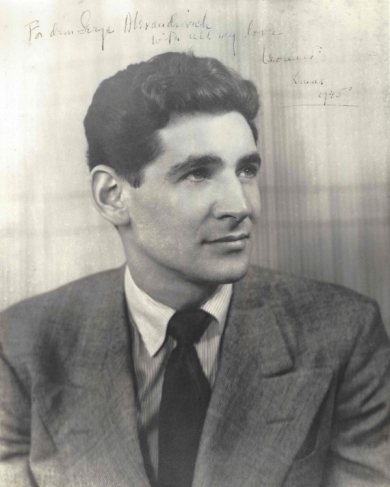
(Leonard Bernstein, 1945; "For Serge Alexandrovich, with all my love, Leonard, Xmas, 1945")
When Bernstein was only twenty-five, he held his first conducting post as Assistant Conductor of the New York Philharmonic. It was in this capacity that, on November 14, 1943, he made his historic conducting debut. With only a few hours’ notice, he substituted for the ailing Bruno Walter at a Carnegie Hall concert and became famous overnight. The performance was broadcast nationwide on CBS radio, and the next day made the front-page of the New York Times. This acclaim quickly led to invitations to conduct orchestras all over the world.
At the same time, Bernstein was beginning to make his mark as a composer. He completed his Symphony No. 1: Jeremiah in 1943, and conducted its world premiere with the Pittsburgh Symphony Orchestra the following year. The symphony won him the New York Music Critics Award. In 1944, Bernstein collaborated with his friend, the dancer and choreographer Jerome Robbins, on a new ballet entitled Fancy Free. The acclaim for the work sparked them to expand it into a full-fledged Broadway musical: with their friends Betty Comden and Adolph Green, they created On the Town (1944) and it became their first Broadway hit.
Bernstein's limitless energy and virtuosity were legend in New York in the 1940s, when he seemed to be everywhere at once. At the time, he began building a conventional conducting career, with the advice and counsel of such mentors as Koussevitzky, Artur Rodzinski, and Dimitri Mitropoulos. His versatility also reinvented the role of the serious American composer, as he moved freely between Broadway, jazz, and classical composition styles. With Comden and Green and their friend Judy Holliday, he performed in nightclubs as part of The Revuers. The night before his impromptu New York Philharmonic debut, mezzo-soprano Jennie Tourel, at her Town Hall debut recital, gave the first performance in New York of Bernstein's "I Hate Music."
In 1945, Bernstein was named Music Director of the New York City Symphony Orchestra, a post he held until 1947. That same year, he conducted in Tel Aviv (then in Palestine) for the first time, beginning a lifelong association with Israel and its people. After the war, Bernstein made his conducting career truly international in scope, and in 1953 became the first American to conduct an opera at Milan's Teatro alla Scala in acclaimed performances of Cherubini's Medea and Bellini's La sonnambula, both with Maria Callas in the title role. With the death of Koussevitzky in 1951, Bernstein's presence at Tanglewood grew, while he also served as a visiting professor at Brandeis University in Boston. That same year, he married the Chilean actress and pianist Felicia Montealegre Cohn, with whom he had three children: Jamie, Alexander, and Nina.
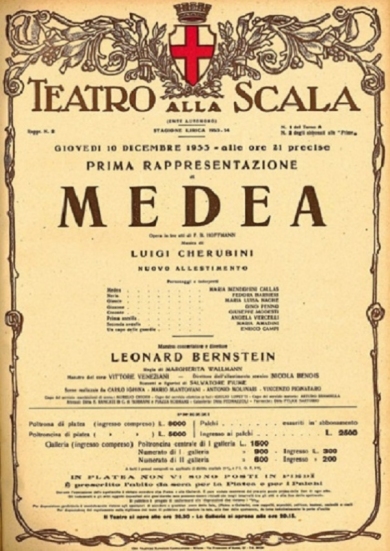
Bernstein's recording career began in earnest in 1956, when he began a long recording artist relationship with Columbia Masterworks (now Sony Classical). Starting in the 1970s, he then built an extensive catalogue of recordings for Deutsche Grammophon.
As television became a part of everyday life, Leonard Bernstein immediately saw its potential in sharing music with a broader audience. His first televised appearance was in 1954 on the CBS television program Omnibus, where he spoke about topics ranging from Beethoven to opera to jazz. However, his television popularity exploded in 1958 when he worked with CBS to broadcast the New York Philharmonic Young People's Concerts for the first time. Through his imaginative programming ideas and engaging presence, he made even the most rigorous elements of classical music an adventure in which everyone could join.
His television work made him the most famous classical musician in America, and he soon became America's cultural emissary on tour with the New York Philharmonic to Moscow in 1959, and to Berlin in 1960. In the 1970s-1990, Bernstein’s concerts with major orchestras the world over were recorded by Unitel, and they were broadcast on PBS’s Great Performances series. Over the course of his career, he won eleven Emmy Awards.
Bernstein became Music Director of the New York Philharmonic in 1958. From then until 1969 he led more concerts with the orchestra than any previous conductor, and was subsequently named a permanent Laureate Conductor. More than half of Bernstein's 500-plus recordings are with the New York Philharmonic. He had a vast repertoire encompassing all periods and styles; however, Bernstein may be best remembered for his performances and recordings of Beethoven, Brahms, Copland, Haydn, Schumann, and Sibelius. Particularly notable were his performances of the Mahler symphonies with the New York Philharmonic in the 1960s, sparking a renewed interest in the works of Mahler.
Following the success of his first symphony, Bernstein composed two additional symphonies. Symphony No. 2: The Age of Anxiety, which premiered in 1949 with the Boston Symphony Orchestra, featured Koussevitzky conducting and Bernstein as piano soloist. Bernstein himself conducted the Israel Philharmonic Orchestra in the premiere of his Symphony No. 3: Kaddish, composed in 1963 and dedicated "To the Beloved Memory of John F. Kennedy."
Other major compositions by Bernstein include Prelude, Fugue and Riffs for solo clarinet and jazz ensemble (1949); Serenade (after Plato’s Symposium) for violin, strings, and percussion (1954); Symphonic Dances from West Side Story (1960); Chichester Psalms for chorus, boy soprano, and orchestra (1965); Mass: A Theatre Piece for Singers, Players and Dancers (1971), commissioned for the opening of the John F. Kennedy Center for the Performing Arts in Washington, DC; Songfest, a song cycle for six singers and orchestra (1977); Divertimento for Orchestra (1980); Halil for solo flute and small orchestra (1981); Touches for solo piano (1981); Missa Brevis for singers and percussion (1988); Thirteen Anniversaries for solo piano (1988); Concerto for Orchestra: Jubilee Games (1989); and Arias and Barcarolles for two singers and piano duet (1988).
Bernstein also wrote the one-act opera Trouble in Tahiti in 1952, and its sequel, the three-act opera A Quiet Place, in 1983. In addition to Fancy Free, he collaborated with choreographer Jerome Robbins on two other major ballets, Facsimile (1946) for American Ballet Theater and Dybbuk (1975) for the New York City Ballet. He received an Academy Award nomination for his score for the award-winning movie On the Waterfront (1954), and also composed incidental music for two Broadway plays, Peter Pan (1950) and The Lark (1955).
Bernstein's contribution to the Broadway musical stage, though limited to only five complete shows, was profoundly important. He again teamed with his On the Town collaborators Comden and Green in 1953 to write the score, in the space of only a few weeks, for Wonderful Town. In collaboration with Richard Wilbur, Lillian Hellman, and others, he wrote Candide (1956) based on Voltaire’s original novella of the same name. Though Candide enjoyed only a brief initial run on Broadway, its score has been held in such high regard that other versions of the show have been successfully realized by such writers as Hugh Wheeler, John Wells, John Caird, Lonny Price, Mary Zimmerman, and Stephen Sondheim. In 1957, Bernstein collaborated with Sondheim, Robbins, and Arthur Laurents to create the landmark musical West Side Story, which had a transforming influence on the Broadway musical and has been made into two Academy Award-winning films (1961 and 2021). Bernstein's final Broadway effort, the 1976 musical 1600 Pennsylvania Avenue, written with Alan Jay Lerner, ran briefly on Broadway. Like Candide, its score is widely admired, and excerpts are presented in A White House Cantata and the Orchestral Suite from 1600 Pennsylvania Avenue.
Many of Bernstein's writings were published in his books The Joy of Music (1959), Leonard Bernstein's Young People's Concerts (1961), The Infinite Variety of Music (1966), and Findings (1982); each has been widely translated. Bernstein also delivered six lectures at Harvard University in 1972–1973 as the Charles Eliot Norton Professor of Poetry. These lectures were subsequently published and televised as The Unanswered Question, and have been translated into five languages.
Bernstein always rejoiced in opportunities to teach young musicians. His master classes at Tanglewood were famous, and he worked to establish the Los Angeles Philharmonic Institute in 1982. He also helped create a world-class training orchestra at the Schleswig Holstein Music Festival, and founded the Pacific Music Festival in Sapporo, Japan. Modeled after Tanglewood, this international festival, including an educational component, was the first of its kind in Asia, and continues to thrive this day. He established scholarship funds at Brandeis, Harvard, the Indiana University School of Music, and Tanglewood. In memory of his wife, he created scholarships for acting students at Columbia University, The Juilliard School, and New York University.
Bernstein received many honors throughout his life. In 1981, he was elected to the American Academy of Arts and Letters, which awarded him its Gold Medal. The National Fellowship Award in 1985 applauded his lifelong support of humanitarian causes. That same year, the National Academy of Recording Arts and Sciences honored Bernstein with the Lifetime Achievement GRAMMY Award. He received MacDowell's Gold Medal; medals from the Beethoven Society and the Mahler Gesellschaft; the Handel Medallion, New York City's highest honor for the arts; a special Tony Award (1969) for Distinguished Achievement in the Theater; and dozens of honorary degrees and awards from colleges and universities. He was presented ceremonial keys to many cities, including Beersheva (Israel), the village of Bernstein (Austria), Oslo, and Vienna. National honors came from Austria, Denmark, Finland, France (Chevalier, Officer and Commandeur of the Legion d'Honneur), Germany (the Great Merit Cross), Israel, Italy, Japan (Praemium Imperiale) and Mexico. He received the Kennedy Center Honors in 1980.
World peace was a particular concern of Bernstein’s. Speaking at Johns Hopkins University in 1980 and at the Cathedral of St. John the Divine in New York in 1983, he described his vision of global harmony. His Journey for Peace tour to Athens and Hiroshima with the European Community Youth Orchestra in 1985 commemorated the 40th anniversary of the atom bomb. In December 1989, Bernstein conducted the historic "Berlin Celebration Concerts" on both sides of the Berlin Wall, as it was being dismantled. The concerts were unprecedented gestures of cooperation, and the orchestra included musicians representing the former East Germany, West Germany, and the four powers that had partitioned Berlin after World War II. Bernstein supported Amnesty International from its inception. To benefit the effort in 1987, he established the Felicia Montealegre Bernstein Fund in memory of his wife who died in 1978.
Leonard Bernstein's heroic role in contemporary musical life has retained its luster and its meaning since his death in 1990. From 2017 – 2019, The Leonard Bernstein Office engaged presenters worldwide to perform his music for the Leonard Bernstein Centennial, a birthday celebration of epic proportion. His educational model, Artful Learning, is practiced in schools throughout the United States. Bernstein’s larger-than-life legacy also endures in several documentaries and two major motion picture films: Stephen Spielberg’s West Side Story (2021) and Bradley Cooper’s Maestro (2022).
© The Leonard Bernstein Office, Inc.
Wynton Marsalis (On Race, Jewish Music, Spirituals, and Bernstein's Legacy)
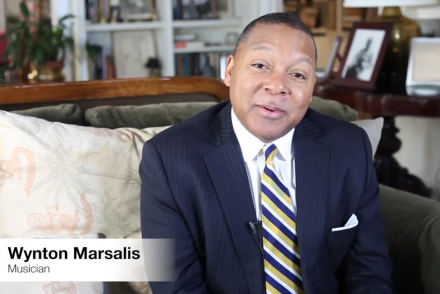
Quincy Jones remembers trying to teach Bernstein how to say "Yo Mama"
